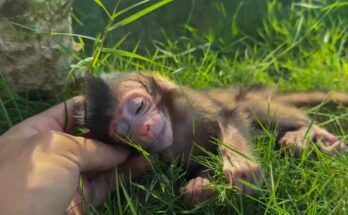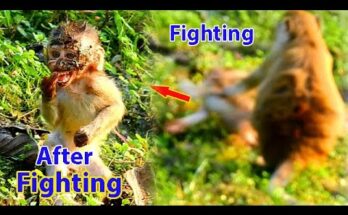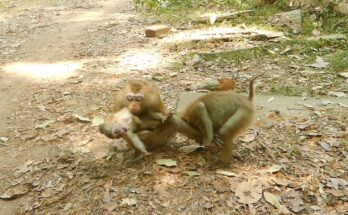In the animal kingdom, we often witness moments of deep tenderness between mothers and their young, especially among primates. But sometimes, the wild shows a different, darker side — one that leaves us with more questions than answers. The video titled “Why Did This Mother Monkey Attack Her Baby? Heartbreaking Scene” captures one of those painful, emotionally charged moments that is difficult to watch and even harder to understand.
In the footage, a mother monkey is seen behaving aggressively toward her own newborn baby. What begins as a seemingly routine interaction — grooming or repositioning — quickly escalates into unexpected violence. She pushes, bites, and even throws the fragile infant, causing it to cry out in fear and pain. Onlookers, both human and monkey, appear confused and distressed. The heartbreaking cries of the baby monkey pierce the air, leaving viewers stunned and emotionally affected.
But why would a mother act this way toward her own child?
In many cases, aggression from a mother to her baby in primates can stem from various complex causes. One of the most common is stress or trauma. Wild monkeys, especially those in areas where human interaction is frequent or where food and safety are not guaranteed, often face high levels of anxiety. If a mother feels overwhelmed, sick, or under threat, her natural maternal instincts may become distorted.
Another reason could be postpartum confusion or rejection. Just like in humans, some animal mothers fail to recognize or bond with their newborns — especially if it’s their first time giving birth. Inexperienced mothers may not know how to care for a baby properly. In this case, the baby may appear more as a source of discomfort than of love, causing an instinctive rejection response that sadly turns aggressive.
It’s also possible that the baby was born with a visible weakness or deformity. In the wild, survival is brutal. Some mothers instinctively abandon or harm infants they perceive as unfit, unable to survive in a harsh environment. While this may seem cruel to us, it is often nature’s way of focusing resources on the strong.
Observers in the video also notice other troop members watching quietly. In monkey societies, troop dynamics play a major role. A mother facing social pressure or conflict within the group may take out her frustration on her young, especially if she is being dominated or threatened by other adults.
No matter the reason, watching a mother attack her own baby is deeply tragic. It reminds us that the lives of wild animals are not only filled with joy and love but also pain, confusion, and struggle — just like humans. This video serves not only as a heartbreaking moment but also as a powerful reminder of how vulnerable both animal and human relationships can be under pressure.
We hope that viewers approach this scene with empathy and a desire to understand, not judgment. With awareness, perhaps more efforts can be made to create safer, less stressful environments for these animals — and prevent future heartbreaking scenes like this.Tools


